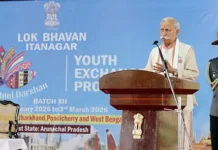ITANAGAR, 26 Nov: Agriculture minister Gabriel D. Wangsu emphasized the importance of understanding the fundamental aspects of agriculture, particularly soil health, to formulate effective policies for the state’s agriculture and allied sectors.
“Farming needs to become a preferred sector in Arunachal Pradesh, and for that, we seek your suggestions and cooperation,” he said while addressing officials at the National Bureau of Soil Survey and Land Use Planning (NBSS&LUP) under the Indian Council of Agricultural Research (ICAR) in Nagpur on Monday.
The minister commended the institute’s contributions to soil science and expressed hope for stronger collaboration in the future. “Your expertise and data are invaluable for us. I came here today not only as a minister but also as a farmer, eager to learn and bring change to my state.” he added.
The NBSS&LUP team, led by its director, presented a detailed overview of the institute’s work through a power-point presentation. They shared findings from their ongoing consultancy projects, including studies on soil properties across different regions of Arunachal Pradesh.
The Arunachal delegation and NBSS&LUP scientists also held discussion on the application of advanced soil management techniques and strategies to enhance agricultural productivity in Arunachal Pradesh.
Later, Wangsu also visited the ICAR-Central Citrus Research Institute (CCRI) in Nagpur, where the institution proposed a joint venture with Arunachal Pradesh to address challenges in citrus cultivation.
Wangsu highlighted the state’s significant potential in citrus farming and expressed concern over the devastating impact of citrus diseases on farmers. “Many of our farmers have become hopeless due to crop failures. The government has taken steps to address these issues, but we need a roadmap for containment and recovery through collaborative efforts with institutes like CCRI,” he said. Wangsu also called for stronger ties to improve farmers’ livelihoods.
The CCRI scientists shared insights into disease management, market demands, and best practices adopted by other states.

